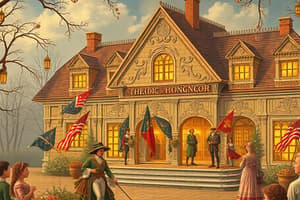Podcast
Questions and Answers
What do historians argue regarding the influence of the colonial era on the formation of the United States?
What do historians argue regarding the influence of the colonial era on the formation of the United States?
- It played a minor role in the formation of the United States.
- It greatly influenced the formation of the United States. (correct)
- It had no influence on the formation of the United States.
- It hindered the formation of the United States.
Which of the following factors set colonial Americans apart and fostered a sense of American identity?
Which of the following factors set colonial Americans apart and fostered a sense of American identity?
- Monarchical rule
- Religious toleration (correct)
- Feudal economic system
- Rigid social hierarchy
Contrary to common perceptions, what structure marked colonial North America according to some scholars?
Contrary to common perceptions, what structure marked colonial North America according to some scholars?
- Communal, socialist
- Egalitarian, democratic
- Anarchic, revolutionary
- Hierarchical, traditional (correct)
What elements did colonial Americans adopt during their transition to becoming distinctively American?
What elements did colonial Americans adopt during their transition to becoming distinctively American?
Which of the following best describes the role of religious beliefs in the lives of colonial Americans?
Which of the following best describes the role of religious beliefs in the lives of colonial Americans?
What contributed to the revival of religion and religious enthusiasm during the early modern period in colonial America?
What contributed to the revival of religion and religious enthusiasm during the early modern period in colonial America?
How did the multicultural tapestry of colonial America contribute to the development of American culture?
How did the multicultural tapestry of colonial America contribute to the development of American culture?
What aspect underscored the dualistic nature of colonial society during the early modern period?
What aspect underscored the dualistic nature of colonial society during the early modern period?
How did the early modern period lay the groundwork for the socio-political fabric of the United States?
How did the early modern period lay the groundwork for the socio-political fabric of the United States?
Why is it essential to delve deeper into the historical underpinnings of colonial America to understand contemporary America fully?
Why is it essential to delve deeper into the historical underpinnings of colonial America to understand contemporary America fully?
Flashcards are hidden until you start studying
Study Notes
Colonial America: The Early Modern Period and Its Unique Experiences
In the annals of American history, the colonial period often serves as a precursor to the nation's birth in 1776. However, many historians argue otherwise, positing that the colonial era greatly influenced the formation of the United States. This perspective emphasizes the unique experiences of colonial Americans, who, despite being descendants of old Europeans, underwent transformations that set them apart. These changes included religious toleration, a market economy, and relatively egalitarian political institutions that fostered a sense of American identity.
Early Modern Condition of Colonial America
Colonial Americans experienced a dynamic transition from their European origins to becoming distinctively American. During this process, they adopted certain elements of religious, cultural, and political pluralism that are now synonymous with the United States. Contrary to common perceptions, colonial society was not uniformly egalitarian or democratic. Some scholars assert that colonial North America was marked by a hierarchical, traditional structure similar to England and Europe. Yet, amidst this complexity, one cannot deny the emergence of traits that would later define America.
Religious Beliefs and Enthusiasm
Religious beliefs played a significant role in the lives of colonial Americans. Their faith encompassed a mix of devotion, skepticism, and spiritual fervor. According to Kimberly Kessler Fergeson, people during this period "believed in God and the Devil; that witches flew, demons possessed children, and spirits wandered between heaven and hell.". Such beliefs contributed to both the revival of religion and the manifestation of religious enthusiasm. These aspects of religious life underscored the dualistic nature of colonial society and served as a foundation for the country's future religious landscape.
Cultural Diversity
Cultural diversity was another hallmark of the colonial era. Alan Taylor, in his book "American Colonies," highlights the broad range of racial, religious, and political groups that inhabited North America, including Native Americans. This multicultural tapestry contributed to the development of a distinct American culture that transcended the boundaries of Europe. By recognizing and understanding the complexities of colonial society, historians can better appreciate how the early modern period laid the groundwork for the socio-political fabric of the United States.
In conclusion, the early modern period of colonial America was a critical phase in the development of the United States. It embodied a blend of continuity and transformation, reflecting the unique experiences of colonial Americans that ultimately shaped American identity. To understand contemporary America fully, it is essential to delve deeper into the historical underpinnings of our national heritage, highlighting the evolution of early modern society into the modern United States.
Studying That Suits You
Use AI to generate personalized quizzes and flashcards to suit your learning preferences.




